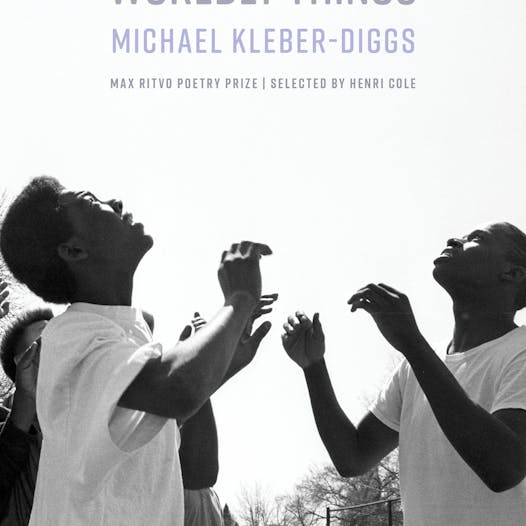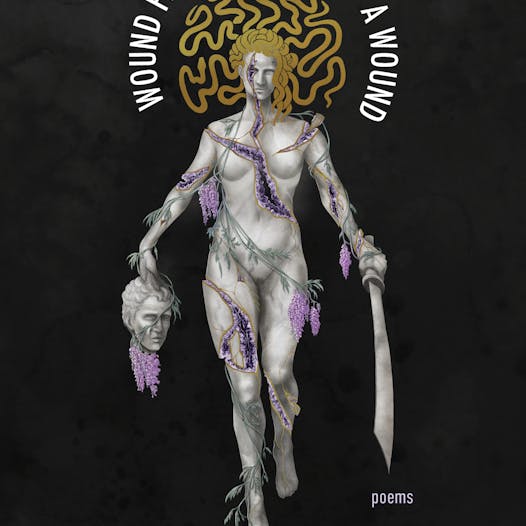"Worldly Things," by Michael Kleber-Diggs. (Milkweed Editions, 88 pages, $22, available June 8.)
St. Paul poet Michael Kleber-Diggs' astonishing debut, winner of the 2021 Max Ritvo Poetry Prize, is a collection of perfectly crafted and expertly paced lyrics, each as arresting as the last. The book orbits the death of his father, a "black hole revolving / around my memory of you." Kleber-Diggs masterfully renders the particular character of that specific tragedy, as well as how it is tangled in the wider net of racism and collective loss that entraps Black lives.
This grieving son is now a loving father, reimagining that role: "Give us fathers strong enough / to admit they want to be near us." These poems are strong enough to pour love on a grandmother "standing resolutely in old resoled shoes, / wearing a dress she'd sewn from a Simplicity pattern" and to decry "America is loving me to death."
"Wound From the Mouth of a Wound," by torrin a. greathouse. (Milkweed Editions, 96 pages, $16.)
In a series of poems about historic models of disability, Minnesota poet torrin a. greathouse reminds readers that what constitutes a disabled body is socially, politically and linguistically constructed. While all bodies are political, some feel that fact with greater force at the end of a stranger's fist or under the impassive scrutiny of medical institutions.
The transgender, disabled body is subjected to "the most brutal science" as is revealed in these dense and intricate poems describing both trauma and resilience. Greathouse's book was winner of the 2020 Ballard Spahr Prize for Poetry. Greathouse writes, "I cannot find the poem in all of this, but I can't bear to let it go unspoken." Luckily for readers, she finds the poem time and again in these revelatory lyrics.
"Since the birth of words we have languaged our history into burnable things." After turning language into a verb, greathouse holds out the tantalizing possibility that we could use language to imagine worlds that welcome marginalized bodies: "If a clock is broken … ask the world to conform / to its sense of time."
"HOMES," by Moheb Soliman. (Coffee House Press, 112 pages, $17.95, available June 8.)
Minnesota artist Moheb Soliman's "HOMES" is a notational travelogue of the Great Lakes coastline. It is mostly written in prose poem with large spaces between phrases that act as line breaks. The title, an acronym for the names of the lakes, suggests that this dynamic border region is not only home to millions of diverse people, but also offers many different versions of home.
In a time of environmental catastrophe and colonial destruction, Soliman's sly and shifting poems suggest that moving between various homes makes more sense than trying to construct a static place of complete belongingness. The pull of home can even be a matter of aesthetics: "In all that splendor / I'd suddenly desired the highway side-lands / the cattails with the pop cans."
"We're the Flownover. We Come From Flyoverland," by Matt Mauch. (Gold Wake Press, 140 pages, $15.95.)
Minneapolis writer Matt Mauch's fourth collection is a compelling mix of dread and delight in poems that jump from corrupt cops to feeding cardinals, the result of "being tossed / about in a washing machine, / trying to see out / the porthole."
The skipping makes the sentences feel alienated, yet they reach across the period's divide like the straight men Mauch describes fumbling over bonding at a cookout with crude jokes.
The poems' detachment is punctuated by moments of luminous discovery that suggest transcendent connection is possible even from behind the porthole's glass in the realization that the sidewalk is "like a bridge of stars" or that the night has been "wallpapered / by Maurice Sendak!"
Elizabeth Hoover is a poet and writer in Milwaukee.
Judge in Trump case orders media not to report where potential jurors work
New attorney joins prosecution team against Alec Baldwin in fatal 'Rust' shooting
Booming cold drink sales mean more plastic waste. So Starbucks redesigned its cups

Allman Brothers Band co-founder and legendary guitarist Dickey Betts dies at 80





